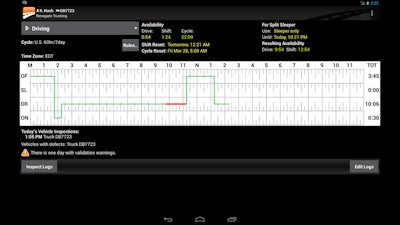
She also told attendees, mostly fleet owners and managers, that the agency has “eroded” medical standards for drivers by allowing people who can’t hear and those with limited vision to obtain a CDL.
Sandberg’s rulemakings update is below. Click here to read the full version of this story on CCJ for more on the recent relaxation of medical standards.
Electronic logging device mandate: Sandberg said the long-awaited ELD mandate, required by 2012’s MAP-21 highway funding act, will likely take effect in late 2017. A proposed rule was published in March (Click here to see Overdrive’s coverage), and it included a 90-day public comment period. Sandberg says the final rule is scheduled for September 2015 publication, and enforcement will begin two years following publication of the final rule.
Speed limiters: As reported by Overdrive of late, a proposed rule mandating the use of speed limiters is expected to be published within the next few months. Sandberg says it is scheduled for publication in January 2015. The agency likely will propose a range of speed settings for heavy-duty trucks, Sandberg says. Like ELDs, the rule should be ready in late 2015 and enforcement should begin in 2017.

Drug and alcohol clearinghouse: A final rule is expected in September 2015, and implementation would begin then, Sandberg says. Click here to read more on the rule, which would establish a database of drivers who have failed or refused to take drug tests. Carriers would be required to upload information to it and query it when making hires and annually for current drivers.
Increase in liability insurance minimum: Sandberg says the Advanced Notice of Proposed Rulemaking should come this week. As reported last week by Overdrive, the ANPRM will not have a number, but instead will be a questionnaire for industry stakeholders to answer. The agency will use the data gleaned from the ANPRM and other sources to form a proposed rule, if it still sees it as necessary.
Entry-level driver training: Sandberg says the agency is still trying to figure out how to approach the rule, and that a final rule is “a long way out.” FMCSA announced last week it intends to survey entry-level drives about their training and safety. It announced this year it is exploring the possibility of approaching the rule as a “negotiated rulemaking.”
Driver coercion rule: Sandberg says a final rule could come in January 2015. The rule was published in May of this year, and once final it will explicitly prohibit coercion of drivers by carriers, shippers, brokers and others who have the ability to coerce drivers to violate federal regulations, like hours-of-service rules. “This is going to have a big impact on others outside the industry who normally haven’t thought that they had much control over the driver and any responsibility for what they did,” she said.
Safety Fitness Determination: A proposed SFD rule is scheduled for March 2015, Sandberg said. The rule would change the way the agency scores trucking companies on safety and would allow the agency to use a data set similar to the Compliance Safety Accountability program’s Safety Measurement System to produce an absolute score for carriers. The score would then be used by the agency to prioritize carriers for intervention.
Insulin dependent drivers: Sandberg expects a rule to be published next year that will allow drivers who meet certain standards to pass a medical exam without needing to get an exemption.
Sleep apnea: The agency is working on a rule that will likely implement requirements for sleep apnea screening. Sandberg did not say when the rule will come.









